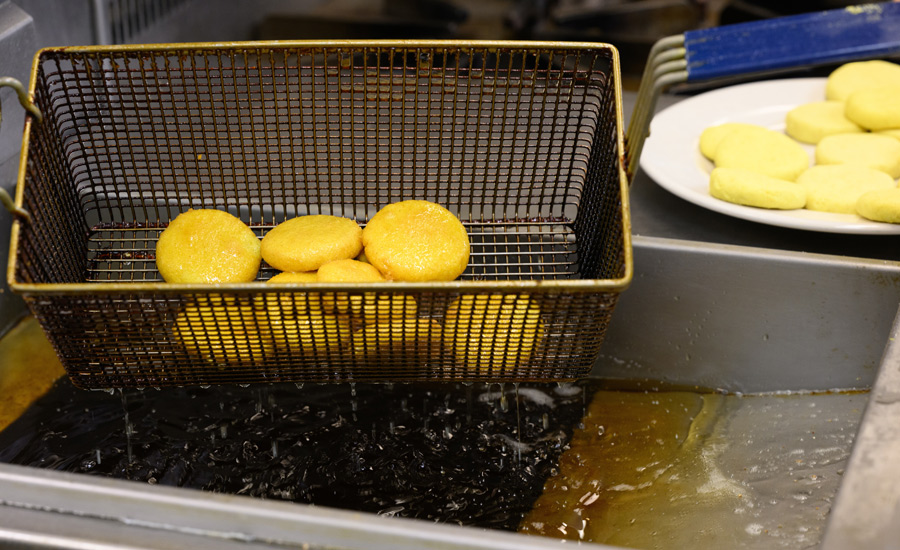The Bottom Line:
- Consumers care about fat and oil content, as well as types
- New oils for frying are offering producers more healthful options
- Producers and consumers alike are concerned about sustainability
Fat and oils are important functional ingredients that can also impact the nutritional profile in snack and bakery products. More than ever, consumers are more mindful of the type of fats and oils being used in their products. Cargill has conducted its annual Fatitudes consumer research which helps the company understand consumer attitudes and behaviors about fats and oils. Jamie Mavec, associate category and product marketing communications manager, Cargill shares some of the highlights from the most recent research: “Currently, half of the U.S. consumers closely monitor fats and oils in food purchases. Most of these consumers are motivated by health considerations, such as reducing risk of heart disease, lowering cholesterol, or losing weight.”
Mavec adds that consumers increasingly are checking ingredient lists for the types of oil, especially compared to when the first Fatitudes survey was issued in 2013.
“Of those checking the ingredient list, 61% say they do so to avoid certain fats and oils, while 31% report they are seeking specific fats and oils,” she relates. “Consumers continue to hold olive and avocado oil in high regard, with those oils having the greatest impact on purchase decisions. On the other end of the spectrum, the research found lard yielded the most negative impact on purchasing decisions”
The company also explored what consumers look for on the package labels. “Claims linked to health, such as ‘no saturated fat,’ generally scored higher than other type of claims, but consumers are influenced by other factors too. In 2023, the survey found 45% of consumers were more likely to purchase products labeled as non-GMO. A similar number, 41% said they were more likely to purchase products labeled as organic,” Mavec says.
New fats and oils
According to Frank Flider, oils consultant, United Soybean Board, “New fats and oils are introduced into the baking industry on a continuing basis. Most of these are focused on what’s trending in current markets as well as for economic reasons. For example, the keto diet has resulted in an increased attempt to use coconut oil in baking, while economic factors and the desire for market share have resulted in new palm-based baking products.”
Flider relates that “the last truly revolutionary product to be introduced was interesterified High Oleic Soybean Oil shortening, which is a blend of approximately 50% each High Oleic Soybean Oil and fully hydrogenated soybean oil. The interesterified high oleic soybean oil shortening can be used in snack and bakery applications like doughnut frying, icing shortening, and all-purpose baking shortening. The interesterified high oleic soybean shortening can be successfully used anywhere other shortenings have been used. Variations of this new technology may include using other oils in place of the fully hydrogenated soybean oil such as palm oil.”
Cargill is launching the PalmAgilty 600 series compound coating fats, specialty fats designed for fillings, drizzling, enrobing, and bottoming bakery products and cereal bars, as well as for sandwich cookies and praline fillings. “A key benefit of the range is its ability to slow fat bloom development (fat bloom refers to the whitish dusting or streaking that forms on the surface of the chocolate), extending shelf life,” shares John Satumba, category R&D leader for indulgence, Cargill.

Cargill reportedly is excited about the growing commitment from its customers and retailers to use sustainably sourced RSPO palm oil. In response, the company has become one of the first large-scale U.S. suppliers to exclusively offer palm oil certified by the Roundtable for Sustainable Palm Oil (RSPO). “The decision to solely offer RSPO-certified palm oil from Cargill’s U.S. refineries addresses rising demand from both consumers, who increasingly prioritize sustainability in their purchase decisions, and food manufacturers and retailers, who are working to advance their supply chain sustainability goals,” states Satumba. As of October 2023, Cargill will no longer offer conventional palm oil in its U.S. portfolio.
“At ADM, we’re committed to advancing fats and oils solutions to meet the current needs of bakers,” shares Michelle Peitz, technical solutions and marketing, ag services, and oilseeds, refined oils, ADM. “We find that, in the marketplace, the emphasis is not solely on introducing new products but optimizing, enhancing and adding flexibility to existing options. This focus aims to strengthen supply chains and enhance efficiency at the bakery level. We utilize our enzymatic interesterification technology to deliver functional solid shortening solutions derived from soy, palm, and palm kernels.”
Laura Cuseo, customer innovation scientist, AAK USA, shares that the company has expanded its AkoPlanet platform for plant-based foods in the U.S. “The expansion introduces a coconut oil that abides by highly sustainable standards and supports AAK’s commitment as a leading supplier of sustainable plant-based ingredient solutions, while supporting farmers, and features traceability to the farm,” she says. “From traceability and transparency on field level practices, to low contaminants and coconut nursery replanting programs, through to ultimately the consumer’s plate, AAK is committed to supporting a more sustainable coconut oil supply chain. With the introduction of AAKPlanet CNO 16-001 in the United States, this product is now available globally.”
Benexia S.A is a chia ingredient-focused company with 20 years of experience. Most recently the company launched ALA Powder. ALA stands for Alpha Linolenic Acid which is sustainable and natural, plant-based Omega-3. Sandra Gillot, CEO, Benexia, describes this latest product: “Benexia created a microencapsulated ALA-rich chia oil in an omega-3 powder ingredient, providing a more stable, free-flowing product for food applications where a powder works better than oil, and allows it to be easily incorporated in bakery and snack products.” Here are some additional benefits of the new product:
- Ultra-high ALA levels: 27 g ALA (plant-based omega-3s) per 100 g
- 24-month shelf life at ambient temperature
- All ingredients are non-GMO by origin
- No effect on the final product’s flavor, smell, texture, or color
- By using this ingredient, producers can use the product claims “Source of Omega-3”
- Adds plant Omega-3, which has been associated with human health (technology allows Omega-3 ALA to be readily absorbed by the body)

Managing the fat profile
Most of the companies weighed in on their approaches to help customers manage the fat profile in their products and provide customized solutions. Producers first need to understand the role the fats and oils are playing in the product, both from a nutritional and functional standpoint and what objectives the customers are trying to achieve.
According to Flider, “Ideally the consumer wants low saturates and moderate levels of polyunsaturates and monounsaturates. The baker is constantly striving for this balance while still maintaining the level of saturates needed for bakery performance and monounsaturates necessary for stability.”
Flider notes that in the case of interesterified High Oleic Soybean Oil shortening, this can be accomplished by slightly modifying the levels of fully hydrogenated soybean oil and high oleic soybean oil. If less saturates are required, more high oleic soybean oil is used. In this way, bakers can optimize their fat profiles without sacrificing quality and performance. Lowering the ratio of fully hydrogenated soybean oil to high oleic soybean oil would result in lower saturates, but also a softer shortening. Softer shortenings can be used for baking applications where structure isn’t as critical, such as cookies, biscuits, and specialty snack items.
AAK offers shortenings for the bakery industry low in saturated fat through the EsSence line of shortenings. This line of shortening is based on canola and palm oil and provides up to a 60% reduction in saturated fat compared to standard palm-based shortenings. These shortenings can be used in a range of snack and bakery applications including breads, cakes, and cookies.
Satumba notes that in formulations that also require more structure, the company can create blends, combining a fat with liquid oils that contain lower levels of saturated fat. For example, its Clear Valle All-Purpose Shortening is a blend of high oleic canola and hydrogenated cottonseed oils. This shortening contains 23% saturated fat, compared to palm, which typically has 50%. Equally important, Clear Vally All-Purpose Shortening reportedly still delivers on plasticity, sensory attributes, and ease of use in operations—all critical factors to bakery customers.
Satumba shares that if oxidative stability is the concern, for example with fried snacks, Cargill offers high stability variants of oils like canola and sunflower. High oleic canola oil has the lowest saturated fat content, is high in monounsaturated fats and boasts high oxidative stability. It’s also known for its clean flavors and it provides a longer fry life than regular canola oil. High oleic sunflower oil has a light color, high oxidative stability and is low in saturated fats. Adding to its label appeal, it is non-GMO sourced.
With consumers being more mindful of the fats and oils being used in their products, suppliers are offering new solutions that deliver functionality, improved nutrition, and sustainability.







